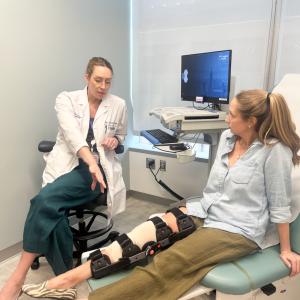
Zamala and Zachary enjoy a happy and healthy joint birthday celebration.
A Staten Island mother and her baby are both celebrating milestone birthdays one year after doctors at NYU Langone saved the mother’s life when she had a rare, life-threating complication during labor.
Zachary Cortes was born on his mother Zamala’s 39th birthday. As she reflects on her first year of motherhood, she’s filled with gratitude, for the care she received and the family she now has.
“Zack was my birthday gift,” Cortes said. “I also think that it’s a gift to him to have his mom’s birthday. Every year on his birthday, no matter how old he could be—80, 90 years old—he will always remember his mother and that he shared that day with me.”
For Cortes and her husband, Eric, the pregnancy was a miracle. A breast cancer survivor, Cortes wasn’t sure if she would be able to conceive naturally after chemotherapy. When they decided to start trying to have a family, Cortes was diagnosed with uterine fibroids—noncancerous tumors of the uterus that can impact fertility based on their size and location. About one year after receiving fertility-sparing, minimally invasive fibroid treatment at NYU Langone’s Center for Fibroid Care, Cortes was pregnant.
“It is just amazing having a child,” she said. “I am looking forward to celebrating our birthdays with my husband and son, reminiscing on all we have been through. I would go through what I went through again just to have Zack. It was all worth it.”
A Complicated Birth
In March 2024 Cortes was pregnant with her first child and having contractions two weeks shy of her due date. She called her doctor, Olivia P. Myrick, MD, MHPE, an obstetrician–gynecologist at NYU Langone, who encouraged her to go to Tisch Hospital for an evaluation.
“I just had a weird feeling that something was wrong,” Cortes recalled. “It was a gut feeling.”
Dr. Myrick noted that while Cortes was experiencing uncomfortable contractions, her overall condition, as well as that of the baby, appeared normal and she was not yet in labor.
“Normally, I would send a patient home to rest and have them return later,” said Dr. Myrick, also a clinical assistant professor in the Department of Obstetrics and Gynecology. “When I walked in to explain this, she just looked so uncomfortable, and I didn’t feel comfortable sending her home when she was in so much pain. We made the decision to go ahead and deliver the baby that day.”
A few hours later, as Cortes was being prepped for delivery, she fainted and was rushed to the operating room for an emergency cesarean section. During the procedure, doctors discovered that Cortes had suffered a placental abruption, a rare but life-threatening condition in which the placenta completely or partially detaches from the wall of the uterus before the baby is born, causing significant blood loss.
“The placental abruption was sort of secretly happening,” Dr. Myrick said. “The baby came out crying, screaming, totally healthy, but Zamala, in a matter of minutes if not seconds, had lost almost all of her blood volume.”
The medical team, which also included obstetrician–gynecologist Sarah A. Shawki, MD, anesthesiologist Hermandeep S. Dhami, MD, and Tisch Hospital patient safety officer and obstetrician Sepideh Mehri, MD, moved swiftly, activating a massive transfusion protocol to replenish her blood supply and administering general anesthesia to make sure she remained in stable condition.
After several hours of care, during which the team continuously updated Cortes’ husband about her condition, Cortes was stabilized and moved to the intensive care unit for further monitoring.
“When I woke up in the ICU, my husband said, ‘We have a healthy baby boy.’”
Maternal Health
As an African American woman, Cortes said, she was aware of the sobering maternal health statistics: In 2021, the maternal mortality rate for Black women was 69.9 deaths per 100,000 live births—nearly 3 times the rate for white women, according to the Centers for Disease Control and Prevention.
“I always had feelings of dread and fear about going to the hospital and giving birth,” Cortes said. “But with NYU Langone, it was different. They listened to me and saw me as a patient that needed help. I live five minutes away from another hospital, but I just don’t think I would have gotten the same care, and I don’t think they would have been prepared to save me once things started to go wrong.”
Cortes’ experience underscores the importance of women trusting their instincts and of doctors listening closely to their patients. NYU Langone has been consistently rated the No. 1 hospital for quality and safety in the United States by Vizient Inc. and the Leapfrog Group.
“In situations like this, the entire care team needs to work together seamlessly,” Dr. Shawki said. “From the obstetricians to the anesthesiologists, every role is vital in providing the best care possible. We prioritize patient safety, listen carefully, and make quick, informed decisions to ensure the best outcome.”
Reflecting on her journey, Cortes offers a message to other women.
“Trust yourself,” she said. “You must advocate for yourself and know when something doesn’t feel right. I trusted myself that I needed to get to the hospital, and I was at the right place at the right time. Dr. Myrick, Dr. Shawki, Dr. Dhami, everybody on the team came together to make sure Zack and I would have this wonderful outcome.”
Media Inquiries
Lacy Scarmana
Phone: 646-754-7367
Lacy.Scarmana@NYULangone.org

